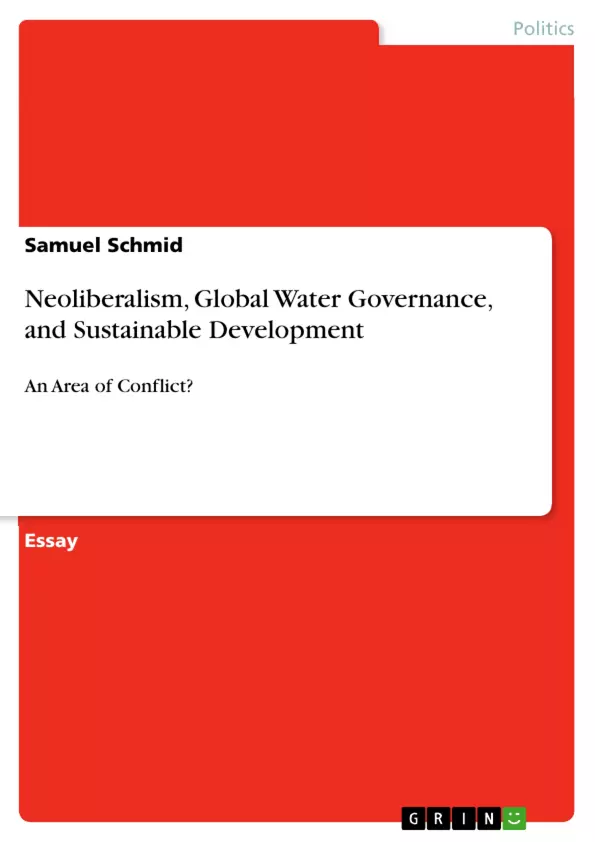The purpose of this essay is to take a step back to reflect and suggest that addressing the „water crisis‟ through approaches informed by neoliberal economic principles like privatization contradict the notion of sustainable development in a way that has the potential to contribute to exacerbating environmental as well as human emergencies. So, the question is: In what ways may neoliberal ideology and interests undermine the effectiveness of the structures and elements of global water governance and its efforts to attain sustainable development in the Third World?1
The answer2 will be developed by looking at (1) a theoretical perspective, (2) the debate on privatization, (3) the global water governance system (as an important background), (4) the UN Millennium Development Goals and the linked concept of sustainable development and finally (5) the drawing of conclusions about its relationship with neoliberalism.
Inhaltsverzeichnis (Table of Contents)
- Introduction
- Theoretical Perspective: A Neo-Gramscian Interpretation
- Water: Public Good or Commodity?
- Actors and Elements of Global Water Governance
- The UN Millennium Declaration and Sustainable Development
Zielsetzung und Themenschwerpunkte (Objectives and Key Themes)
This essay aims to examine the potential contradictions between neoliberal economic principles and sustainable development in the context of global water governance, focusing on the implications for the Third World.
- The influence of neoliberal ideology and its impact on global water governance
- The debate surrounding privatization of water resources
- The concept of sustainable development and its relationship to neoliberal policies
- The role of global actors, including international financial institutions, in shaping water governance
- The implications of neoliberal practices for environmental and social emergencies in developing countries
Zusammenfassung der Kapitel (Chapter Summaries)
- Introduction: This section introduces the concept of the "water crisis" and its potential impact on global stability, particularly in the Third World. It outlines the essay's objective of exploring the potential contradictions between neoliberal economic principles and sustainable development in the context of global water governance.
- Theoretical Perspective: A Neo-Gramscian Interpretation: This section examines the prevailing development ideology within neoliberal economics, focusing on modernization theory and its critiques. It introduces the concept of hegemony and its role in shaping a global neoliberal project.
- Water: Public Good or Commodity?: This chapter explores the shift from water as a public good to a commodity under the influence of neoliberal principles. It examines the economic and political forces that drive this shift, particularly in developing countries facing debt burdens.
- Actors and Elements of Global Water Governance: This chapter explores the complex landscape of global water governance, outlining its key actors and institutions. It discusses the evolution of the concept of water governance and its various dimensions, including political, social, economic, and administrative aspects.
Schlüsselwörter (Keywords)
This essay focuses on the interplay between neoliberal economics, global water governance, and sustainable development, highlighting key themes such as privatization, commodification, environmental security, the role of international financial institutions, and the impact of neoliberal policies on developing countries.
Frequently Asked Questions
How does neoliberalism affect global water governance?
Neoliberalism promotes the privatization and commodification of water, treating it as a commercial good rather than a public right, which can undermine sustainable development.
What is the contradiction between privatization and sustainable development?
Privatization often prioritizes profit over equitable access, which can exacerbate environmental and human emergencies in the Third World, contradicting the goals of sustainable development.
What is the "Neo-Gramscian" perspective on water?
This perspective views the shift toward water privatization as part of a global neoliberal hegemony, where powerful actors shape international norms to serve specific economic interests.
What role do international financial institutions play?
Institutions like the World Bank often link debt relief or loans to the requirement of privatizing public services, including water management, in developing countries.
How do the UN Millennium Development Goals relate to this?
The essay discusses how neoliberal practices can hinder the attainment of UN goals, particularly those related to environmental sustainability and access to clean water.
- Quote paper
- Samuel Schmid (Author), 2010, Neoliberalism, Global Water Governance, and Sustainable Development, Munich, GRIN Verlag, https://www.grin.com/document/151970



